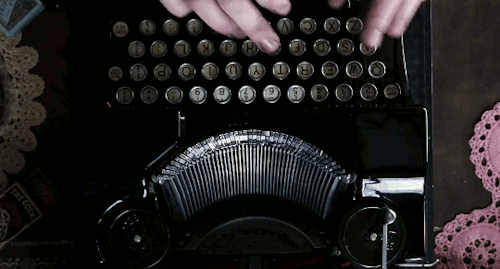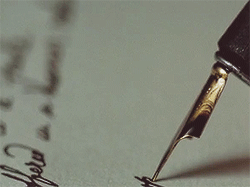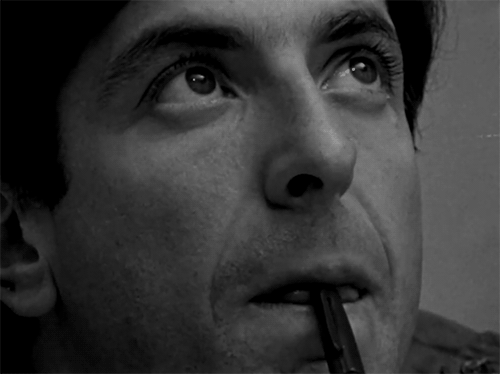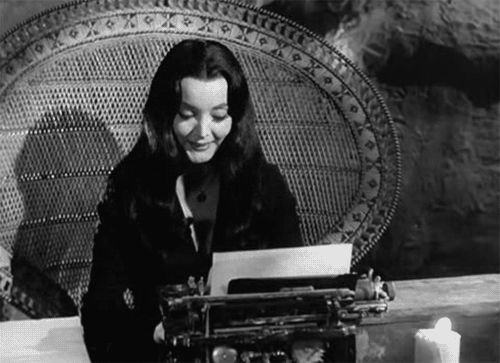#can u tell a lot of james is just me? i’m a whole fraud
Note
Hey I wanted some insight on how to write James with more depth. I saw on a one of your post you mentioned not liking that he matured for a girl, and I can agree. And I saw you mentioning his elderly parents and how they died around the war. How do you think being raised by older parents affected his character overall?
oh hey anon 💜💜 i’m not sure i’m the best person for advice on how to write a character w depth (since it’s something i routine eschew in favor of self indulgence) but i can certainly try!
so, i’m not sure if effie and flea dying from illness (dragonpox?) is canon or not but i certainly treat it so. i think they passed away around his 7th year, maybe midway through, and that just strengthened his resolve to join the order. plus, it gives me a more plausible reason for why him and lily married so young.
regarding how growing up with elderly parents might’ve affected him, here’s a few possible options:
- kind, kind, kind. he’s sincere and polite and has impeccable manners (does he sometimes give up on them if the situation calls for? sure) because it’s been instilled in him from birth. i think family portraits going back generations also played a huge role here.
- he’s great with small talk and endearing himself to old people. he’s used to his parents’ friends and often, he prefers being with them over his peers because he can understand them and their motivations better. i think while he was an extrovert and definitely loved hanging out with people, his social skills were a bit rusty bc he’s not grown up around a lot of kids so he doesn’t rly know how to relate to them. (enter: my hc that james uses old people swears like good heavens and goodness gracious) he had to stumble around to get better with his batchmates in hogwarts and even then, he sometimes slips up and goes into geriatric mode and gets teased a lot for it.
- i also think he’d be big on like, tradition and superstition? even when he stops actually believing in them, he still does it bc of habit or ‘what’s the harm?’ or he wants to keep some part of his parents alive. he’s probably thought up all kinds of things he wants to do with harry and teach him and habits to instil in him which just makes it that much more tragic that he didn’t get to
- his nurturing nature came from an acute awareness of his parents’ mortality and taking care of them from a young age. i see flea and effie as realists, treating james as an equal for all that they coddle him. so they’ve never hid this part from him and he’s always had a low grade fear? anxiety? about when time will run out so he tries to over compensate for it by doing the most. (sometimes i hc a james with control issues but that’s a tangent)
- on the flip side, his arrogance definitely came from being a miracle baby. he had all the silver/gold/platinum spoons in his mouth and so much privilege he doesn’t know what to do with it. while his heart is in the right place, effie & flea were cut from the same cloth so his understanding of these nuances came much, much later as he started interacting with people in hogwarts who had very different lives. i think this made him a bit insensitive at times, but definitely the aforementioned heart makes sure he makes amends, even if they’re fumbling and based on trial-and-error.
- he was a lonely kid!! as much as he loved his parents and their friends and his life, he still grew up mainly alone in a large manor with nothing but portraits to talk to and that had to have had an effect on him. combine that w his never ending energy and always being switched on and is it any wonder he keeps doing The Absolute Most when he finally gets to hogwarts? how hard he latches on to sirius?
- oh also, i think he definitely has some form of rejection sensitivity. i’ve mentioned this before but i think, despite his confidence, it can be easy to make him self conscious by bringing up say, how loudly he talks or how he ‘never shuts up’ or ‘oh my god ur so annoying potter do u ever just, chill out’ (one reason why a lot of jily fics don’t agree w me tbh), partly because he’s never really been criticised before so he doesn’t know how to constructively deal with it and partly bc he’s always thinking in extremes and doesn’t want to be a bother so he decides completely shutting himself off is the only acceptable solution. (another hc: sirius knows this, understands it as an actual problem, and is therefore the only one who can bring up his faults/tell him to cut it out without sending him into a guilt/hurt spiral)
i’m...gonna stop here. i don’t know if all of these make sense but it’s how i see james (i think) so i rly hope it helps u! if u end up writing a fic/post (even if it doesn’t have any of this lol), tag me so i can read it <333 happy writing, anon!
#james potter#obligatory disclaimer: these are all headcanons bc we don’t have enough info so don’t@ me#i know there’s another post about him being raised by elderly parents but i haven’t read it so i can’t link it sorry!#some of these are pulled from irl#i’ve been around a lot of old people (often in a partial caretaker capacity) since i was young and that’s influenced this#also how single children w indulgent parents act#the being good with old people one especially- my fav people to hang out w at family events are the grandparents#they consistently surprise me + have the best stories and i spend hours around them#gonna be honest. ages in hp have always confused me. i thought 100+ was the norm but people regularly die earlier#which yeah ik wartime but still. bc if it was that old then james wouldn’t be worried but idk#it’s inconsequential but something i wonder about occasionally#once again i have been unable to control myself#sigh#can u tell a lot of james is just me? i’m a whole fraud#pen’s asks
11 notes
·
View notes
Text
33 Unusual Tips to Being a Better Writer
via James Altucher

Back in college, Sanket and I would hang out in bars and try to talk to women but I was horrible at it.
Nobody would talk to me for more than thirty seconds and every woman would laugh at all his jokes for what seemed like hours.
Even decades later I think they are still laughing at his jokes. One time he turned to me,
“the girls are getting bored when you talk. Your stories go on too long. From now on, you need to leave out every other sentence when you tell a story.”
We were both undergrads in Computer Science. I haven’t seen him since but that’s the most important writing (and communicating) advice I ever got.
33 other tips to be a better writer:
A) Write whatever you want. Then take out the first paragraph and last paragraph

Here’s the funny thing about this rule. It’s sort of like knowing the future. You still can’t change it. In other words, even if you know this rule and write the article, the article will still be better if you take out the first paragraph and the last paragraph.
B) Take a huge bowel movement every day
You won’t see that on any other list on how to be a better writer. If your body doesn’t flow then your brain won’t flow. Eat more fruit if you have to.
C) Bleed in the first line

We’re all human. A computer can win Jeopardy but still not write a novel. If you want people to relate to you, then you have to be human.
Penelope Trunk started a post a few weeks ago:
“I smashed a lamp over my head. There was blood everywhere. And glass. And I took a picture.”
That’s real bleeding. My wife recently put up a post where the first line was so painful she had to take it down. Too many people were crying.
D) Don’t ask for permission
In other words, never say “in my opinion” (or worse “IMHO”). We know it’s your opinion. You’re writing it.
E) Write a lot

I spent the entire 90s writing bad fiction. 5 bad novels. Dozens of bad stories. But I learned to handle massive rejection. And how to put two words together. In my head, I won the pulitzer prize. But in my hand, over 100 rejection letters.
F) Read a lot

You can’t write without first reading. A lot. When I was writing five bad novels in a row I would read all day long whenever I wasn’t writing (I had a job as a programmer, which I would do for about five minutes a day because my programs all worked and I just had to “maintain” them). I read everything I could get my hands on.
G) Read before you write

Before I write every day I spend 30-60 minutes reading high quality short stories poetry, or essays. Here are some authors to start:
Denis Johnson
Miranda July
David Foster Wallace
Ariel Leve
William Vollmann
Raymond Carver
All of the writers are in the top 1/1000 of 1% of writers. What you are reading has to be at that level or else it won’t lift up your writing at all.
H) Coffee

I go through three cups at least before I even begin to write. No coffee, no creativity.
I) Break the laws of physics
There’s no time in text. Nothing has to go in order. Don’t make it nonsense. But don’t be beholden to the laws of physics. My post, Advice I Want to Tell My Daughters, is an example.
J) Be Honest
Tell people the stuff they all think but nobody ever says. Some people will be angry that you let out the secret. But most people will be grateful. If you aren’t being honest, you aren’t delivering value. Be the little boy in the Emperor Wears No Clothes. If you can’t do this, don’t write.
K) Don’t Hurt Anyone
This goes against the above rule, but I never like to hurt people. And I don’t respect people who get pageviews by breaking this rule.
Don’t be a bad guy. Was Buddha a Bad Father? addresses this.
L) Don’t be afraid of what people think
For each single person you worry about, deduct 1% in quality from your writing.
Everyone has deductions. I have to deduct about 10% right off the top.
Maybe there’s 10 people I’m worried about. Some of them are evil people. Some of them are people I just don’t want to offend.
So my writing is only about 90% of what it could be. But I think most people write at about 20% of what it could be. Believe it or not, clients, customers, friends, family, will love you more if you are honest with them. We all have our boundaries. But try this: for the next ten things you write, tell people something that nobody knows about you.
M) Be opinionated
Most people I know have strong opinions about at least one or two things… write about those. Nobody cares about all the things you don’t have strong opinions on.
Barry Ritholz told me the other day he doesn’t start writing until he’s angry about something. That’s one approach. Barry and I have had some great writing fights because sometimes we’ve been angry at each other.
N) Have a shocking title
I blew it the other day. I wanted to title this piece: “How I torture women” but I settled for “I’m Guilty Of Torture.” I wimped out. But I have some other fun ones, like “Is It Bad I Wanted My First Kid To Be Aborted” (which the famous Howard Lindzon cautioned me against).
Don’t forget that you are competing against a trillion other pieces of content out there. So you need a title to draw people in. Else you lose.
O) Steal
I don’t quite mean it literally. But if you know a topic gets pageviews (and you aren’t hurting anyone) than steal it, no matter who’s written about it or how many times you’ve written about it before. “How I Screwed Yasser Arafat out of $2mm” was able to nicely piggyback off of how amazingly popular Yasser Arafat is.
P) Make people cry

If you’ve ever been in love, you know how to cry.
Bring readers to that moment when they were a child, and all of life was in front of them, except for that one bittersweet moment when everything began to change. If only that one moment could’ve lasted forever. Please let me go back in time right now to that moment. But now it’s gone.
Q) Relate to people
The past decade has totally sucked. For everyone. The country has been in post-traumatic stress syndrome since 9/11 and 2008 only made it worse. I’ve gone broke a few times during the decade, had a divorce, lost friendships, and have only survived (barely) by being persistent and knowing I had two kids to take care of, and loneliness to fight.
Nobody’s perfect. We’re all trying. Show people how you are trying and struggling. Nobody expects you to be a superhero.
R) Time heals all wounds
Everyone has experiences they don’t want to write about. But with enough time, its OK. My New Year’s Resolution of 1995 is pretty embarrassing. But whatever…it was 16 years ago.
The longer back you go, the less you have to worry about what people think.
S) Risk
Notice that almost all of these rules are about where the boundaries are. Most people play it too safe.
When you are really risking something and the reader senses that (and they WILL sense it), then you know you are in good territory. If you aren’t risking something, then I’m moving on. I know I’m on the right track if after I post something someone tweets, “OMFG.”
T) Be funny

You can be all of the above and be funny at the same time.
When I went to India I was brutalized by my first few yoga classes (actually every yoga class). And I was intimidated by everyone around me. They were like yoga superheroes and I felt like a fraud around them. So I cried, and hopefully people laughed.
It was also a case where I didn’t have to dig into my past but I had an experience that was happening to me right then. How do you be funny? First rule of funny: ugly people are funny. I’m naturally ugly so its easy. Make yourself as ugly as possible. Nobody wants to read that you are beautiful and doing great in life.
U) The last line needs to go BOOM!

Your article is meaningless unless the last line KILLS.
Read the book of short stories “Jesus’ Son” by Denis Johnson. It’s the only way to learn how to do a last line. The last line should take you all the way back to the first line and then “BOOM!”
V) Use a lot of periods
Forget commas and semicolons. A period makes people pause. Your sentences should be strong enough that you want people to pause and think about it. This will also make your sentences shorter. Short sentences are good.
W) Write every day

This is a must. Writing is spiritual practice. You are diving inside of yourself and cleaning out the toxins. If you don’t do it every day, you lose the ability. If you do it every day, then slowly you find out where all the toxins are. And the cleaning can begin.
X) Write with the same voice you talk in
You’ve spent your whole life learning how to communicate with that voice. Why change it when you communicate with text?
Y) Deliver value with every sentence
Even on a tweet or Facebook status update. Deliver poetry and value with every word. Else, be quiet.
Z) Take what everyone thinks and explore the opposite
Don’t disagree just to disagree. But explore. Turn the world upside down. Guess what? There are people living in China. Plenty of times you’ll find value where nobody else did.
AA) Have lots of ideas

I discuss this in “How to be the Luckiest Man Alive” in the Daily Practice section.
Your idea muscle atrophies within days if you don’t exercise it. Then what do you do? You need to exercise it every day until it hurts. Else no ideas.
BB) Sleep eight hours a day

Go to sleep before 9pm at least 4 days a week. And stretch while taking deep breaths before you write. We supposedly use only 5% of our brain. You need to use 6% at least to write better than everyone else. So make sure your brain is getting as much healthy oxygen as possible. Too many people waste valuable writing or resting time by chattering until all hours of the night.
CC) Don’t write if you’re upset at someone
Then the person you are upset at becomes your audience. You want to love and flirt with your audience so they can love you back.
DD) Use “said” instead of any other word
Don’t use “he suggested” or “he bellowed,” just “he said.” We’ll figure it out if he suggested something.
EE) Paint or draw.

Keep exercising other creative muscles.
FF) Let it sleep
Whatever you are working on, sleep on it. Then wake up, stretch, coffee, read, and look again.
Rewrite. Take out every other sentence.
GG) Then take out every other sentence again.
Or something like that.
Sanket didn’t want to go to grad school after we graduated. He had another plan. Lets go to Thailand, he said. And become monks in a Buddhist monastery for a year. We can date Thai women whenever we aren’t begging for food, he said. It will be great and we’ll get life experience.
It sounded good to me.
But then he got accepted to the University of Wisconsin and got a PhD. Now he lives in India and works for Oracle. And as for me…
I don’t know what the hell happened to me.
About the Author:
James Altucher is an American hedge fund manager, entrepreneur, bestselling author, venture capitalist and podcaster. He has founded or cofounded more than 20 companies, including Reset Inc. and StockPickr and says he failed at 17 of them.
via jamesaltucher.com
#writing#tips#psychology#lit#books#culture#life#studyblr#education#studyspo#reference#writers on tumblr#writing tips
15K notes
·
View notes
Text
Reflections on the “F” Word
While I disapprove of the word’s overuse and find it annoying much of the time, it remains one of the more interesting monosyllabic expletives in the English language for a variety of reasons. Just by its sound it can describe, pain, pleasure, hate and love. In language it can function as many parts of speech: a verb both transitive and intransitive; a gerund; a noun or pronoun; an adjective; an adverb; and an interjection. It’s a versatile word from a grammatical perspective and one that can describe with pointed emphasis a wide range of emotions, feelings, states of being and circumstances as these examples found on the web will attest:
• Ignorance: Fucked if I know.
• Trouble: I guess I’m fucked now!
• Fraud: I got fucked at the used car lot.
• Aggression: Fuck you!
• Displeasure: What the fuck is going on here?
• Difficulty: I can't understand this fucking job.
• Incompetence: He‘s a fuck-off.
• Suspicion: What the fuck are you doing?
• Enjoyment: I had a fucking good time.
• Request: Get the fuck out of here.
• Hostility: I'm going to knock your fucking head off.
• Greeting: How the fuck are you?
• Apathy: Who gives a fuck?
• Innovation: Get a bigger fucking hammer.
• Surprise: Fuck! You scared the shit out of me!
• Anxiety: Today is really fucked.
Roots
Linguisticians really have no clear idea where the word comes from. A few myths and folk etymologies have sprung up in the absence of a definite origin. The most common derive it from “fornication under consent of the king” or “for unlawful carnal knowledge,” and as with almost every other etymology based on an acronym, neither is true.
In English, swear words tend to have Germanic, rather than Latin etymology. We know where “shit” comes from—no pun intended. It has a Germanic root with obvious connections to words in other languages: Dutch schijt, German Scheiße, Swedish skit. It also shows up in Old English, as the verb scittan. The experts can trace a clear, linear etymology for it. Alas, the same can’t be said for “fuck,” although the search for its roots makes for an interesting etymological expedition.
It may be a native English word, from a Proto-Germanic verb along the lines of fukkon, which could in turn be from the Proto Indo European root pewg-, meaning “to jab” or “to hit”. Under this etymology, its origins are as clear as shit’s. But this explanation may rest more on speculation than fact.
Germanic words of similar form (f + vowel + consonant) and meaning ”copulate” are many. One of them is ficken. They often have additional senses, especially 'cheat,' but their basic meaning is 'move back and forth.' Most probably, fuck is a borrowing from Low German and has no cognates outside Germanic.
Early records of “fuck” are chiefly from Britain’s north, especially Scotland, so it may have begun as a northerner’s verb. Not all, but many of the words that exist primarily in Scotland and northern England, for example, bairn, gang, aye, kirk, etc., are from Old Norse. The Viking invasions left their impact on English as a whole, but especially in northern Britain where their settlements were concentrated. (Even today residents of North Britain use words and speak in accents that betray their Norse roots and mystify Americans and their English cousins to the south.)
Swedish fokka (“copulate”) and Norwegian fukka (“copulate, strike, push”) are now only dialectal terms, but given that they both mean “fuck” and are apparently related, they may go back to an unattested Old Norse verb. If this etymology is to be believed, then the Old Norse version of fukka came to Scotland first, before dispersing to the rest of the English-speaking world.
Another theory traces the Modern English verb to Middle English fyke, fike ("move restlessly, fidget") which also meant "dally, flirt," and probably is from a general North Sea Germanic word (compare Middle Dutch fokken, and German ficken). This would parallel in sense the vulgar Middle English term for "have sexual intercourse," swive, from Old English swifan "to move lightly over, sweep.” But the OED remarks that these "cannot be shown to be related" to the English word. (As an aside, the Old English verb for "have sexual intercourse with" was hæman, from ham "dwelling, home," with a sense of "take home, co-habit.")
Speaking of the original Oxford English Dictionary, its editors omitted as taboo the “F” word when the "F" entries were compiled between 1893 and 1897. Dr. Johnson also had excluded the word, and “fuck” wasn't in a single English language dictionary from 1795 to 1965. The Penguin Dictionary broke the taboo in the latter year. Houghton Mifflin followed in 1969 with The American Heritage Dictionary, but it also published a “clean” edition without the word, to assure itself access to the public high school market.
The written form of the word is attested from at least the early 16th Century although the verb form appears to have been found in an English court manuscript from 1310. The second edition of the OED cites 1503, in the form fukkit, and the earliest attested appearance of the current spelling is 1535 in Sir David Lyndesay’s Ane Satyre of the Thrie Estaits: "Bischops ... may fuck thair fill and be vnmaryit.” Apparently sex scandals in the Church were prevalent even then.
As an aside, “flying fuck” originally meant "sex had on horseback" and is first attested circa 1800 in a broadside ballad called New Feats of Horsemanship.
Censorship
“Fuck” was outlawed in print in England by the Obscene Publications Act of 1857, and in the U.S. by the Comstock Act of 1873. The legal barriers against use in print broke down the mid-20th Century with the "Ulysses" decision (U.S., 1933) and "Lady Chatterley's Lover" (U.S., 1959; U.K., 1960).
In 1948, the publishers of The Naked and the Dead persuaded author Norman Mailer to use the euphemism “fug.” When Mailer later was introduced to Dorothy Parker, she greeted him with, "So you're the man who can't spell 'fuck'." (The quip is sometimes attributed to Tallulah Bankhead.) The major breakthrough in publication was James Jones' From Here to Eternity (1950), with 50 fucks (down from 258 in the original manuscript).
In a 1972 monologue, the late comedian George Carlin famously listed the "Seven words you can never say on television," to wit, shit, piss, fuck, cunt, cocksucker, motherfucker, and tits.
At the time, the words were considered inappropriate for broadcast on the public airwaves in the United States, whether radio or television; and most of the words on Carlin's original list remain taboo on American broadcast television but are heard with astonishing regularity on unregulated cable as an evening watching HBO will demonstrate. But words forbidden to polite society didn’t originate with Carlin; the ancient Romans had ten words that were considered taboo (and therefore used regularly): cunnus, futuo, mentula, verpa, landica, culus, pedico, caco, fello and irrumo. I’ll let the reader translate those words for which the English equivalent isn’t obvious.
At the Movies
1939’s Gone with the Wind ends with these memorable lines:
Scarlett: Where shall I go? What shall I do?
Rhett: Frankly my dear, I don’t’ give a damn.
What today is hardly regarded as even a mildly profane expression caused a sensation in the USA in 1939. Sixty-six years later the iconic quotation was voted the number one movie line of all time by the American Film Institute.
The word “damn” had been prohibited by the 1930 Motion Picture Association’s Production Code (aka, the Will Hayes Office), drawn up as the country was in the grips of prohibition and a fiery debate about declining moral standards which social critics attributed in no small measure to the alleged excesses of the Hollywood dream machine and the immoral behavior of the people who starred in its films.
Against this backdrop, producer David O. Selznick and story editor Val Lewton worked hard to keep the movie close to the book. Of the word “damn” Selznik told the Hayes censors, "It is my contention that this word as used in the picture is not an oath or a curse. The worst that could be said of it is that it’s a vulgarism." In the end, the film got special dispensation to use "damn" and "hell" in specific situations.
But before they got the OK, Selznick and Lewton solicited alternate endings. They came up with 20, more or less, among them:
Frankly my dear, I don’t’ give a straw.
Frankly my dear, I don’t’ give a hoot.
You can go to the devil for all I care.
My indifference is boundless.
The Hollywood Production Code was adopted by the film industry to counter efforts to establish government censorship of cinema in 1930, although it was not seriously enforced until 1934 and continued in effect until 1965 when it was replaced by the current ratings system.
During Hollywood’s golden age, producers, writers and directors came up with a bag of tricks designed to do an end run around the censors whom they regarded as overly zealous, excessively self-righteous and conspicuously dumb. One technique was to write witty, sharp-edged dialogue replete with double entendres and a heavy dose sexual innuendo.
One such example comes from the 1946 film noire The Big Sleep, a mostly inscrutable piece of detective fiction penned by Raymond Chandler. The principals, Vivian Rutledge (Lauren Bacall) and Philip Marlow (Humphrey Bogart), engage in a famous, slyly flirtatious, sexy horse-race conversation scripted by an uncredited Julius Epstein. At one point, she rates him as a potential lover, using a horse analogy to talk in a veiled way about her feelings toward men and sex. The dialogue is outrageously suggestive without using a single off color word:
Vivian: Tell me: What do you usually do when you're not working?
Marlowe: Oh, play the horses, fool around.
Vivian: No women?
Marlowe: I'm generally working on something, most of the time.
Vivian: Could that be stretched to include me?
Marlowe: Well I like you. I've told you that before.
Vivian: I like hearing you say it. But you didn't do much about it.
Marlowe: Well, neither did you.
Vivian: Well, speaking of horses, I like to play them myself. But I like to see them work out a little first, see if they're front-runners or come from behind, find out what their whole card is. What makes them run.
Marlowe: Find out mine?
Vivian: I think so.
Marlowe: Go ahead.
Vivian: I'd say you don't like to be rated. You like to get out in front, open up a lead, take a little breather in the backstretch, and then come home free.
Marlowe: You don't like to be rated yourself.
Vivian: I haven't met anyone yet that can do it. Any suggestions?
Marlowe: Well, I can't tell till I've seen you over a distance of ground. You've got a touch of class, but, uh...I don't know how - how far you can go.
Vivian: A lot depends on who's in the saddle. Go ahead Marlowe, I like the way you work. In case you don't know it, you're doing all right.
Marlowe: There's one thing I can't figure out.
Vivian: What makes me run?
Marlowe: Uh-huh.
Vivian: I'll give you a little hint. Sugar won't work. It's been tried.
“Fuck” began to break into cinema when it was uttered once in the film Vapor (1963) and in two Andy Warhol films: Poor Little Rich Girl (1965) and My Hustler (1965), and later in each of two 1967 British releases, Ulysses and I'll Never Forget What's 'is name. It was also used several times in the 1969 British film Bronco Bullfrog. According to director Robert Altman, the first time the word "fuck" was used in a major American studio film was in 1970's M*A*S*H, spoken by Painless during the football match at the end of the film. Since then it’s been a free-for-all as many films have attempted, and succeeded, in desensitizing audiences to the shocking effects of the F-word.
Bad Santa, a dreadful black comedy in which Billy Bob Thornton spends 90 minutes uttering non-stop expletives is one example. Another is 2017’s The Wife, an altogether splendid film—a great story complemented by terrific performances by Glen Close and Jonathan Prices—that suffers from what I would argue is overuse of the “F” word.
It’s not that I’m a prude; I’m not. It’s not that I’m offended. I’m not. It’s not that I don’t use the word; I do. And its not that I’m for censorship (heaven forfend!). But as a lover of and sometimes lecturer on old films, I’m saddened that writers and directors ignore context and insert gratuitous profanity in dialogue when the scene doesn’t really call for it. Okay, Tony Soprano’s crew really does talk that way, and so does Casino’s Nicky Santoro. And the creative social commentary of George Carlin and Lewis Black would fall pretty flat were it not punctuated by a flurry of forbidden expletives. In their mouths the language works; in the mouths of lesser so-called comedians it’s just unfunny. And unnecessary. It’s all a matter of context.
It probably says something about the state of English-speaking society that there are people who actually count occurrences of the word ‘fuck’ in films. Director Martin Scorsese is the undisputed Father of Fuckage. “Fuck” and its derivatives is spoken a staggering 506 times in The Wolf of Wall Street, setting a new Guinness World Record for most swearing in one film. And Scorsese has two other films that made the top ten list of “fuck”-ridden films:
1. The Wolf of Wall Street (Martin Scorsese, 2013). 506 times (every 2.83 minutes).
2. Summer of Sam (Spike Lee, 1999). 435 times (every 3.06 minutes).
3. Nil by Mouth (Gary Oldman, 1997). 435 times (every 3.34 minutes).
4. Casino (Martin Scorsese, 1995). 422 times (every 2.4 minutes).
5. Alpha Dog (Nick Cassavetes, 2006). 367 times (every 3.11 minutes).
6. End of Watch (Dir. David Ayer, 2012). 326 times (every 2.99 minutes).
7. Twin Town (Kevin Allen, 1997). 318 times (every 3.21 minutes).
8. Running Scared (Wayne Kramer, 2006) 315 times (every 2.58 minutes).
9. Goodfellas (Martin Scorsese, 1990). 300 times (every 2.05 minutes).
10. Narc (Joe Carnahan, 2002). 297 times (every 2.82 minutes).
One could imagine the closing scene of Gone with the Wind if Scorsese had directed it. Perhaps it might have gone like this:
Scarlet: Rhett, I don’t know what the fuck to do!
Rhett: Franky my dear, I don’t give a shit.
#fuck#etymology of fuck#profanity#F word in cinema#censorship#Martin Scorsese#Hollywood Production Code#Hayes Office
0 notes